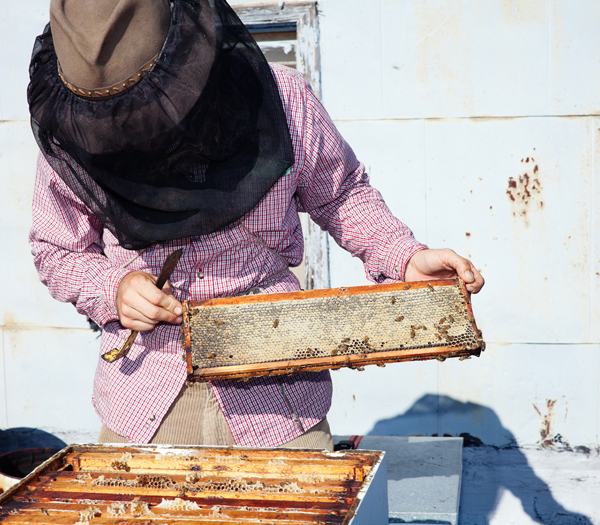 Milk & Honey Market bottles urban honey
Milk & Honey Market bottles urban honey
by Natalie Hope McDonald
By the middle of June, Michelle Niedermeier’s oldest son started smelling the honey. Selected as one of seven beehive hosts in the city, the family’s West Philadelphia backyard was a contributor to Milk & Honey Market’s unique summer project.
Partnering with Two Gander Farm (Lancaster County), the West Philly market harvested honey from urban beehives throughout Philadelphia. The “Summer in the City Honey” program produced sweet stuff bottled from neighborhoods around town and also offered an unusual opportunity for locals to become urban apiarists.
“We would sit by the hives every day and watch the bees fly in and out,” says Neidermeier. In May, the hive, which housed thousands of honeybees, was relocated from Lancaster County to the family’s yard. The bees worked tirelessly to produce honey until July, when it was harvested and they were taken back to their country home.
A mother of two, Niedermeier says both of her boys—ages nine and six—have learned lessons from the bees. Her youngest son even created a PowerPoint presentation for his class. “We learned to stay out of the bees’ flight path,” she says. “And no one ever got stung.”
When the project was first conceived, no one anticipated they would bottle thousands of honey jars. But finding homes for the hives was easy—Milk & Honey received at least 35 requests.
“We looked for backyards that were fenced and relatively isolated,” explains Milk & Honey co-owner Annie Baum-Stein. Hives were distributed in West, South and North Philly, as well as, appropriately enough, Queen Village. A portion of the proceeds benefit the Philadelphia Orchard Project.
“We chose to bottle honey to demonstrate the importance of bees to sustainable agriculture,” says Baum-Stein. “We hope the Summer in the City Honey will get people thinking and talking about eating locally, urban farming and sustainable agriculture. We also hope that while we all enjoy the hard work of the urban bees, some will consider the significant connection between urban farming and rural farming.”
She says the Philly bees are exceptionally healthy thanks to their stay. “The bees are now fortified and have been spared a lot of pesticide exposure,” says Baum-Stein, who hosted a lively hive on the roof of the market with the help of Trey Flemming, Two Gander Farm’s resident apiarist. “Amazingly, honey harvested from our roof and honey from four blocks away tastes very different, ” she adds.
With the exception of two hive tragedies—a tree crushed a hive during a windstorm and a queen died in Powelton Village—the project is a testament to sustainable living, something Baum-Stein says inspired her to open Milk & Honey in the first place.
“We created this product for the sake of the bees and for the importance of sustainable beekeeping,” she says. “We hope to keep the bees on our roof year-round, and hope to start the host-a-hive program again next summer.”
Milk & Honey Market, 4435 Baltimore Ave., 215-387-6455, milkandhoneymarket.com





